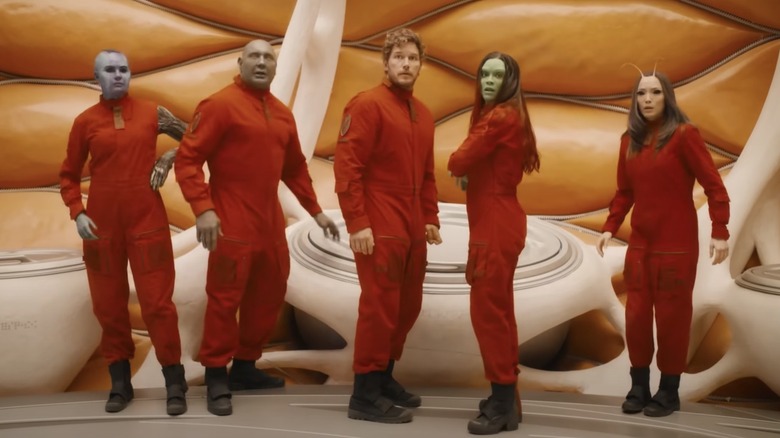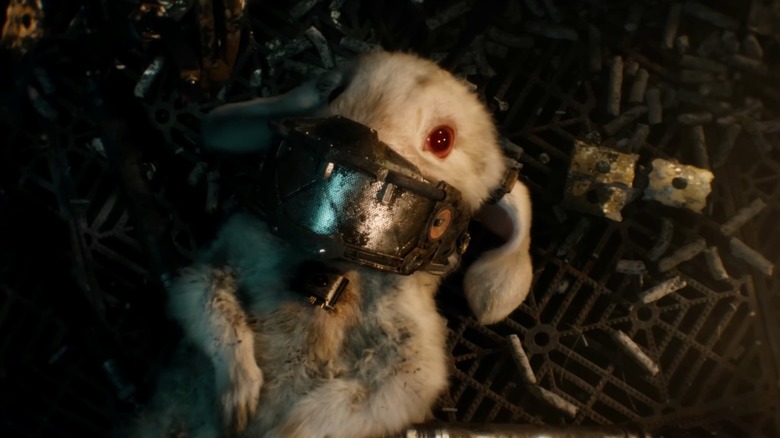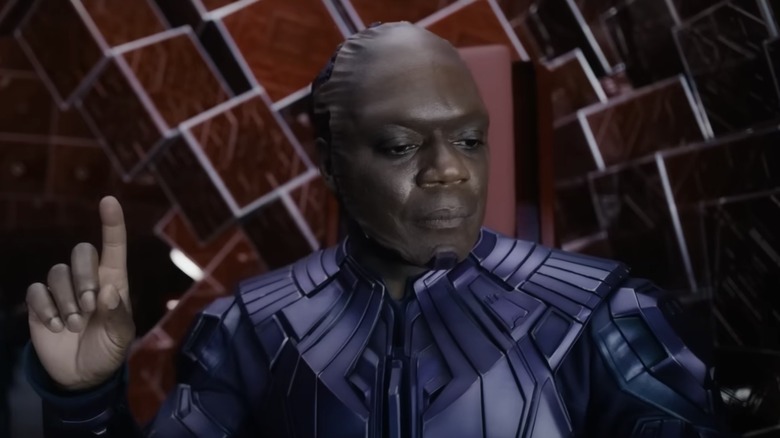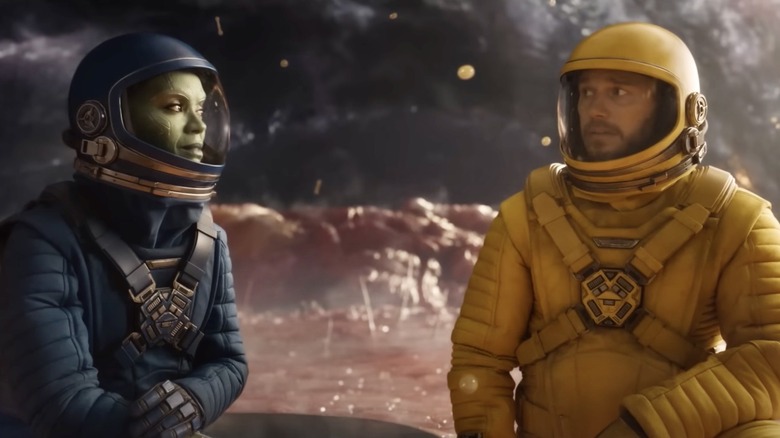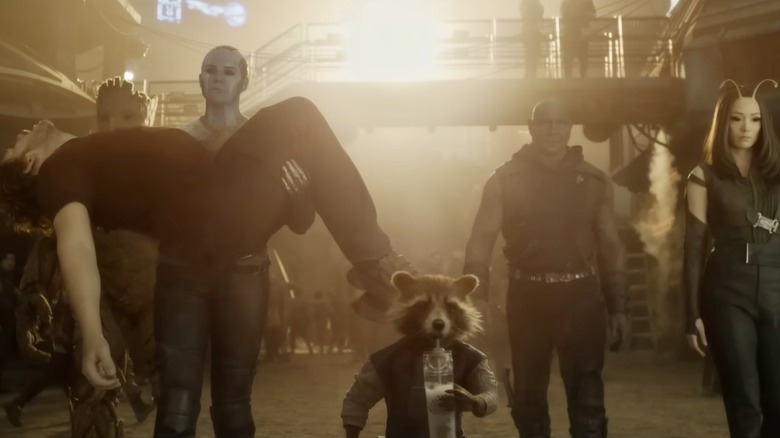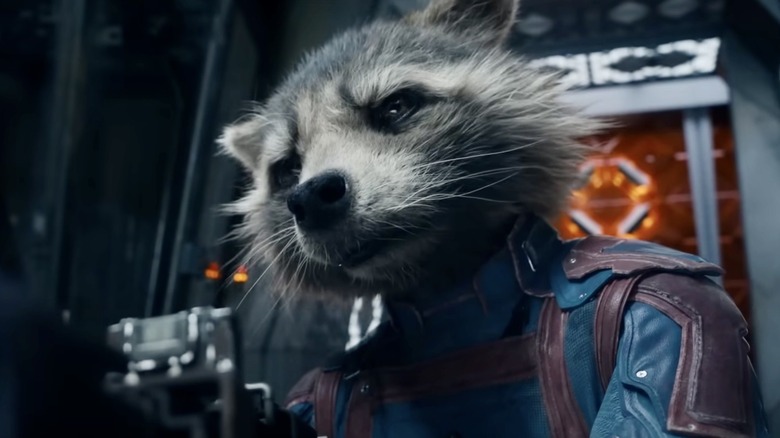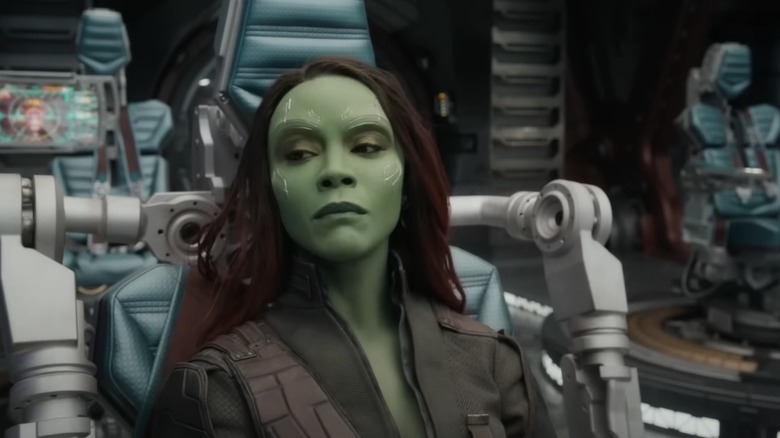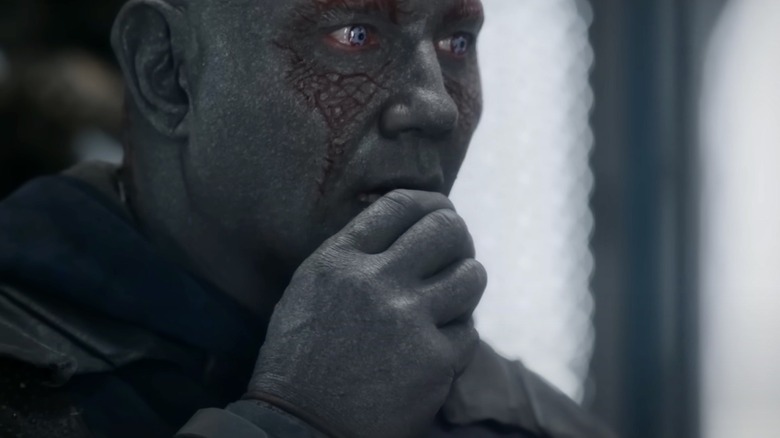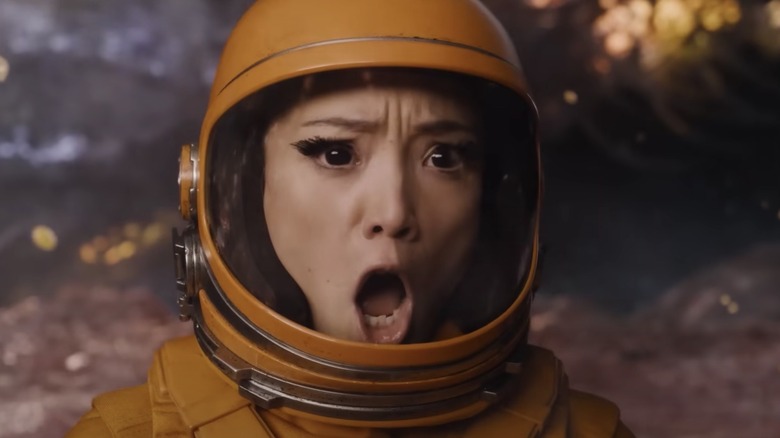Guardians Of The Galaxy Vol. 3 Ending Explained: The Rocket To Knowhere
This post contains spoilers for "Guardians of the Galaxy Vol. 3."
There's a lot going on in the Marvel Cinematic Universe's 32nd film, "Guardians of the Galaxy Vol. 3." Between animal cruelty, kids in cages, grotesque biomechanical creatures, a beheading, a peeled face, and one anti-climactic f-bomb ("Open the f***ing door!"), it's arguably too much. Writer-director James Gunn's belated trilogy ender is all over the place, both tonally and narratively, and it's easy to lose track of what's happening or why, even if you come into it with the best intentions and are still invested in the MCU as it chugs along in Phase Five.
It's been six years since "Guardians of the Galaxy Vol. 2," and while the Guardians have remained active on the big screen in other films (most recently, "Thor: Love and Thunder"), moviegoers who missed "The Guardians of the Galaxy Holiday Special" on Disney+ may be confused by the presence of new team members like Cosmo the Spacedog (Maria Bakalova), or the addition of plot points like the fact that Mantis (Pom Klementieff) and Peter Quill (Chris Pratt) are half-siblings.
We have a refresher on everything you need to remember to understand "Guardians of the Galaxy Vol. 3," which may help with some of that. It's a Marvel movie, of course, so although a talking raccoon named Rocket and his twisted origin are at the center of it, it's not rocket science. A person can always just turn off their brain, sit back and enjoy the theme park ride (as Martin Scorsese would perhaps rightfully call this one), and never think of the movie again after that. For anyone who still has lingering questions after they walk out of the theater, though, here's what we make of the "Guardians of the Galaxy Vol. 3" ending.
When animals are attacked
In "Guardians of the Galaxy Vol. 3," the inciting incident comes when Adam Warlock (Will Poulter) barrels in and puts Rocket Raccoon (Bradley Cooper) out of commission. The Guardians find a kill switch left on Rocket by his maker, and it's the quest for the off code to this switch that sees them touching down on the squishy meat satellite of Orgocorp before they fly to Counter-Earth.
Rocket is out cold for most of the movie, but inserted at various points are random flashbacks showing his backstory as a genetically engineered raccoon. He's not the only game in town anymore when it comes to talking MCU animals. "Moon Knight" had its chatty hippo and crocodile gods; "Guardians of the Galaxy Vol. 3" has Rocket befriend an otter named Lylla — voiced by Hawkeye's wife, Linda Cardellini — along with a big goofy walrus and a rabbit with mechanical spider legs.
Later, we see a bipedal panda mowing the lawn. Ant-Man's ex-wife, Judy Greer, voices the henchwoman War Pig, who lumbers in like a cyborg Bebop from "Teenage Mutant Ninja Turtles." This movie has more critters than "Doolittle," but apart from the Spacedog, most are the handiwork of the High Evolutionary, played by "Peacemaker" actor Chukwudi Iwuji. James Gunn also imports Ratcatcher from "The Suicide Squad," Daniela Melchoir, as the red-skinned Ura.
Gunn may have underestimated the impact of seeing a cute, shivering animal behind bars say, "It hurts," onscreen, or maybe he just wanted to be that nasty. However, the mistreatment of Rocket and friends serves a thematic point.
The High Evolutionary believes all living things should uphold the aphorism, "Be not as you are, but as you should be." On Counter-Earth, he's even remade the Statue of Liberty in his own image. (Yes, he's holding a monkey.)
A perfectionist, but not
Not only does the High Evolutionary believe he can improve on nature and New York landmarks, but he's also the kind of quasi-perfectionist who trashes his previous creations, even slaughtering an entire civilization. As the monologuing Dr. Moreau of the cosmic MCU, his vision of a utopia through "programmed evolutionary changes" involves incinerating animals and eventually destroying Counter-Earth when it's clear the back streets of this place are less-than-perfect. The reason he wants to harvest Rocket Raccoon's brain so badly is that Rocket, or 89-P13 as he calls him, showed himself capable of devising an intelligent solution to the design flaw that was making the High Evolutionary's experimental lifeforms violent monstrosities.
As the High Evolutionary sends Counter-Earth to the recycle bin, Peter Quill jumps off his ship, followed by Groot, who sprouts tree wings and flies them to safety. Unfortunately, Nebula (Karen Gillan), Drax (Dave Bautista), and Mantis didn't get the memo, so they go to rescue them on the High Evolutionary's ship and get trapped there until Kraglin (Sean Gunn) flies in with the cavalry, which consists of the whole outpost of Knowhere, a Celestial's giant dead head.
The High Evolutionary quells a mutiny before the Guardians finally defeat him, and we see that he hid his own imperfections after young Rocket clawed his face off. It's weird to hear Drax, one of the heroes, exclaim, "Kill him!" but Rocket has matured beyond such bloodthirstiness, and he recognizes that the High Evolutionary "didn't want to make things perfect. He just hated things the way they were."
Confronting his maker — who presumably dies when his ship explodes — and seeing other caged raccoons gets the older, wiser Rocket to accept that, despite his insistence to the contrary, he, too, really is a raccoon.
Accepting oneself and others
Rocket Raccoon isn't the only character who learns to accept his true nature by the end of "Guardians of the Galaxy Vol. 3." There's also Peter Quill, who, as Nebula observes, has been running from who he is since his mother died and he became a space pirate with Yondu (Michael Rooker, who cameos to help Kraglin master the whistle-controlled arrow).
Quill also spent a lot of time wanting the current Gamora (Zoe Saldana) to be someone she isn't. He had a whole relationship with another Gamora, but that version fell off a cliff in "Avengers: Infinity War," and this is a different one plucked from the past. She can't even get his name right and calls him "Quinn."
The message "Accept who you and others are" trickles down to more supporting characters in "Guardians of the Galaxy Vol. 3." Even Cosmo the Spacedog has a subplot that involves Kraglin mislabeling her a "bad dog" and her just wanting to be acknowledged as the good telekinetic dog she is. Understanding James Gunn's artistic intent on this front and the broad strokes of the plot/ending may be enough for some viewers to feel satisfied with "Vol. 3," since it clearly attempts to carve out meaning and do more than just coast along on the residual goodwill of earlier "Guardians" outings.
"Did that look cool?" the movie asks, hoping for a yes from the audience. Not all reviewers have answered yes, with our own chief film critic calling "Vol. 3" "rushed and surprisingly bland." Yet there's still plenty to discuss, so if the flashbacks don't work for you, the needle drops feel more forced, and the movie ends "not with a bang, but with a simper," let's work through that and some other issues in how it's executed.
None of the Guardians die
Perhaps the most surprising "Guardians of the Galaxy Vol. 3" end twist is that, aside from the High Evolutionary and Adam Warlock's golden mom, Ayesha (Elizabeth Debicki), no one important dies. This is surprising if only because the movie teases more than one hero's death, only to pull back and reveal each moment as a fake-out.
The first fake-out came in the trailers when we saw the Guardians walking toward the camera, with Nebula carrying Peter Quill's body (really, an ultra-realistic Chris Pratt doll). It turns out he's just drunk, and that image comes from the beginning of the movie.
At Orgocorp, Nathan Fillion's bulbous guard shoots Drax and leaves him with a hole in his chest before delivering another devastating shot to his back. As Drax falls and Mantis cries out, it's played like a moment of high drama, possibly death. The other Guardians have to carry Drax out, and this was another image seen in the Super Bowl trailer.
In the next scene, however, the Guardians are talking on their ship, and Drax is there and he's fine. The way it's edited, he's had a quick change of clothes, but the movie never addresses how he healed. Presumably, the team could have mended his wounds offscreen with the same medical technology that allowed them to instantly heal the limbs Adam Warlock mangled when he first attacked.
Toward the end, Rocket seems set to join Lylla and friends in animal heaven. Quill wails in grief as Rocket flatlines, but then Lylla tells Rocket that it's not his time, and he returns to life. The plot-armored Quill himself appears to be headed Yondu's way, freezing to death in space, before Adam Warlock floats in at the end to save him.
Celebrate the love, jub, jub
Though our heroes all live happily ever after in "Guardians of the Galaxy Vol. 3," they won't be doing it together. The team amicably breaks up at the end, with a new group of Guardians forming around Captain Rocket.
Mantis, eager to break free of doing what others like Ego (Kurt Russell in "Vol. 2") and the Guardians tell her, goes off on her own with her newly tamed Abilisk pets. They're the same toothy, tentacled alien monsters from the opening of "Vol. 2," but she reminds us they eat batteries, not people, and besides, she's a high-powered empath who can make aliens dance or fall in love with a mere touch of the hand.
Drax wants to go with Mantis so they can continue their "Holiday Special" adventures, but Nebula needs him on Knowhere, where they're building a new society. It turns out Drax has a way with kids, and Nebula says he was born to be a dad, not a destroyer.
Gamora returns to the Ravagers, led by Sylvester Stallone's Stakar Ogord, while Peter Quill returns to Earth to meet his long-lost grandfather. There's more than one group hug to go around, and before the credits roll, "Guardians of the Galaxy Vol. 3" ends with the residents of Knowhere all dancing. It's an ending reminiscent of "Return of the Jedi," where we see Rebels dancing with furry Ewoks in what's been called a "teddy bear luau."
It's been 40 years this month since the original version of that "Star Wars" movie's ending, where those Ewoks joyously sang, "Celebrate the love," in translated Ewokese, and, "Yub nub" (meaning "Freedom"), in untranslated Ewokese. "Guardians of the Galaxy Vol. 3" substitutes platinum-haired super-children for Ewoks; instead of, "Yub, nub," they say, "Jib, jib," and, "Jub, jub."
Star-Lord will return, others won't
"Guardians of the Galaxy Vol. 3" is light on credits scenes compared to "Vol. 2," which had five of them, but the mid-credits scene solidifies the team's new line-up as: Rocket, Groot, Kraglin, Cosmo the Spacedog, Adam Warlock, and one of the aforementioned super-children who escaped the High Evolutionary's ship. Her name is Phyla-Vell, and though she vaguely resembles an evil "Village of the Damned" kid, she has a history tied to Captain Marvel in Marvel Comics.
It's probably no coincidence that three of the six remaining Guardians (Rocket, Groot, and Cosmo) are characters where the actor only has to lend their voice to the role. Groot finally says, "I love you, guys," at the end of the movie, but until now, all Vin Diesel has had to do is repeat, "I am Groot," and collect a paycheck (#Family #ThatMarvelMoney). Contrast this with Zoe Saldana and Dave Bautista, both of whom have been sitting in the makeup chair, having green prosthetics applied to their faces, for years.
Saldana has said she's done playing Gamora and hopes the character gets recast. Bautista has also said that he views "Guardians of the Galaxy Vol. 3" as the perfect end to Drax's story, probably because his character was initially driven by the loss of his daughter and wife, but now he has a new batch of cosmic rugrats to parent.
The very last thing we see in the post-credits scene is Peter Quill back on earth, eating breakfast with his grandfather, followed by the words, "The legendary Star-Lord will return." It seems Chris Pratt is sticking around the MCU, though it remains to be seen where he'll show up and if it will be on Disney+ or in some future "Avengers" or "Guardians of the Galaxy" movie.
The End: What went wrong?
For moviegoers who were more befuddled than entertained by "Guardians of the Galaxy Vol. 3" and its willful weirdness, the thing that may need the most 'splaining is what went wrong with this three-quel and why — despite its kitchen-sink approach to storytelling — its happy ending feels so homogenous and unappetizing, like Drax's fish-shaped poop.
For much of its 150-minute runtime, "Vol. 3" shapes up like any other recent cosmic Marvel movie. When the first "Guardians" film dropped in 2014, it was something new and different, a breath of fresh ozone, but now the field has grown more crowded, and it's not limited to outer space anymore. Movies like "Eternals," "Doctor Strange in the Multiverse of Madness," "Thor: Love and Thunder," and "Ant-Man and the Wasp: Quantumania" have consistently expanded out the MCU into zany, "Guardians"-like CG realms.
With "Guardians of the Galaxy Vol. 3," the MCU gets further untethered from any semblance of earthbound reality. Thankfully, it's still got Spider-Man swinging around Manhattan, while "Shang-Chi and the Legend of the Ten Rings" and "Black Panther: Wakanda Forever" have explored other earth cultures. As for the "Guardians" trilogy and why it ends with such a sloppy yet safe kiss, the answer may simply be that James Gunn has too much love for these characters and was spread too thin as the new boss of DC Studios.
Gunn's case recalls that of "Love and Thunder" director and co-writer Taika Waititi, who juggled his "Thor" four-quel with acting and directing in "Our Flag Means Death" and "throwing everything at the wall" for a new "Star Wars" movie he's developing. Coincidentally, like Christian Bale's "Love and Thunder" heavy, Gorr the God Butcher, the High Evolutionary is a villain who kidnaps space children. He even screams, "There is no God!"
Drunk on yelling in Knowhere
In "Guardians of the Galaxy Vol. 3," it's not just the High Evolutionary who yells his dialogue. James Gunn dials the shout-o-meter up to 11 all-around, so much so that if you played a drinking game every time a character shouts, you'd be as drunk by the end as Peter Quill is at the start.
In the end, with Quill back on terra firma and other characters scattered across space, "Guardians of the Galaxy Vol. 3" leaves the door open for any and all Guardians to return (possibly through recasting, or, God forbid, digital doubling) in the future. In this way, despite the credits coming full circle with images from previous films, "Guardians of the Galaxy Vol. 3" feels less like a grand trilogy conclusion and more like a gaudy display of creative self-indulgence that somehow doubles as the 32nd corporate construct to roll off the Orgocorp Marvel Studios assembly line.
The movie is open-ended enough that it might instill hope for fans of Adam Warlock (a character with a rich comic book history) for him to develop into something more than a weak background character. The "Guardians" series could go the "Captain America" route and continue with different leads in a hypothetical "Vol. 4." We've been promised (or threatened with) Star-Lord's return, and some viewers may respond favorably to the closure of key character arcs and how it reinforces the theme of accepting yourself for who you are, and not who you or anyone else wants you to be.
If you're feeling charitable, you could apply that same lesson to this imperfect three-quel. Everyone else can just shut out all the noise and pretend that the continuing space saga of the Guardians of the Galaxy ended with the MCU in "Avengers: Endgame" in 2019.
